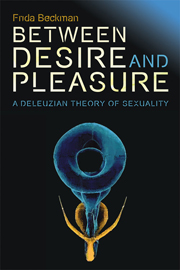Book contents
- Frontmatter
- Contents
- Preface
- Introduction: The Body without Orgasm
- 1 A Nonlinear History of Sexuality: Deleuze with Foucault
- 2 Psychoanalysis Unhinged: Deleuze with Lacan, Klein and Reich
- 3 Folding, Individuation and the Pleasurable Body
- 4 Orgasmic Feminism
- 5 Disabling Sex: Inventing a People who are Missing
- 6 Becoming-Animal and the Posthuman Orgasm
- 7 Capitalism and Sexuality
- Epilogue: Swedish Sin, or the Importance of Remaining Curious
- Bibliography
- Index
1 - A Nonlinear History of Sexuality: Deleuze with Foucault
Published online by Cambridge University Press: 05 October 2013
- Frontmatter
- Contents
- Preface
- Introduction: The Body without Orgasm
- 1 A Nonlinear History of Sexuality: Deleuze with Foucault
- 2 Psychoanalysis Unhinged: Deleuze with Lacan, Klein and Reich
- 3 Folding, Individuation and the Pleasurable Body
- 4 Orgasmic Feminism
- 5 Disabling Sex: Inventing a People who are Missing
- 6 Becoming-Animal and the Posthuman Orgasm
- 7 Capitalism and Sexuality
- Epilogue: Swedish Sin, or the Importance of Remaining Curious
- Bibliography
- Index
Summary
We are informed that if repression has indeed been the fundamental link between power, knowledge, and sexuality since the classical age, it stands to reason that we will not be able to free ourselves from it except at a considerable cost: nothing less than a transgression of laws, a lifting of prohibitions, an irruption of speech, a reinstating of pleasure within reality.
(Foucault 1990a: 5)Introduction
Deleuze's understanding of pleasure as a mode of capture and his claiming of desire as a mode of production build on a rather disparate tradition of theories of sexuality. Therefore, it is necessary to approach his oeuvre with an eye to his ideas about pleasure and desire by identifying key moments of influence. Our point of arrival is an explication of how the relationship between desire and pleasure in Deleuze is illuminated, enhanced or problematised by the rich tradition of writing on which it is built. Deleuze's philosophy of desire in general demands attention to how both cultural artefacts and philosophical theories produce problematic relations between desire and pleasure. His two most central interlocutors are Foucault and psychoanalysis. These two are central enough, not just to Deleuze's philosophy but to conceptions of sexuality more generally, to warrant some space of their own at the beginning of this study, and while this chapter will be devoted to the study of the former, the latter will be analysed in the following chapter.
- Type
- Chapter
- Information
- Between Desire and PleasureA Deleuzian Theory of Sexuality, pp. 16 - 29Publisher: Edinburgh University PressPrint publication year: 2013



